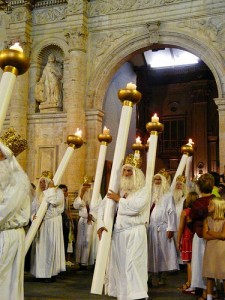This week, Pastor David begins a series on the first few chapters of 1 Corinthians, a letter written to an ancient church with modern-day problems. Despite all the issues at Corinth, Paul writes in 1 Corinthians 1:1-9 that the believers there are called to be holy, and that God will keep them blameless until the day of Jesus’s return. How does this passage reveal that “Jesus is the subject”? (And what does that phrase mean?) Click below to listen in to this week’s sermon!
The Year in (P)Review
Today is the last day of 2013, and a new year is soon to dawn. In fact, I have a friend who lives in New Zealand, and at this moment she is already several hours into 2014! The future is always very nearly upon us.
At this time of year, we often look back on the year that has passed, and we consider what the upcoming year may hold. I invite you to take a few moments to reflect on the life of Mt. Haley Church of God with me.
Successful Worship
Today, I read an article posted on the Church of God Ministries news website. This article is entitled “Turning Hearts and Minds Toward God in Worship,” and it explains the approach to worship taken by one large Church of God congregation in Scottsdale, Arizona. There are some incredible stories coming from that congregation: many people being baptized as believers, many people engaging in mission projects in that community, worship attendance doubling over the past four years.
But what I find fascinating in this article is how they describe their approach to worship.
Pastor’s Appreciation

This past month was “Pastor Appreciation Month,” and I have to admit: I feel very appreciated! Thank you to all of you who sent cards, gave gifts, wrote notes, and participated in last Sunday’s potluck dinner after church. None of those expressions of appreciation are required; they are all “bonus blessings” from my perspective. I feel confident in speaking on behalf of Pastor Jerry when I say that we are both deeply grateful and appreciative of you, the good people of Mt. Haley Church of God.
As this month draws to a close, I think it is proper to turn things around. Another way to read “Pastor Appreciation Month” is to ask the question, “For what is your pastor appreciative?” So here is a short summary of a few reasons that I am grateful to be your pastor:
- Your hard work and volunteer attitude. Tara and I have frequently commented on how blessed we are to serve a church that serves! Any time a need arises in our congregation or community, we can count on several people – depending on the required skill sets – showing up to lend a hand. Packing groceries, hauling wood, raking leaves, cooking meals, providing transportation … you serve in wonderful ways.
- Your willingness to learn about the Bible. I am grateful that every single approach to teaching the Bible I have tried has worked – whether Sunday morning sermons, Sunday evening Bible studies, devotional booklets, or anything else! I think back to the study on Revelation we finished about a year ago, and I see a congregation full of people who are really interested in tackling the hard stuff. That’s an enormous help to your pastor!
- Your gentleness and flexibility. Do you realize that Tara and I have served here three years already? And do you remember that this is the first and only church I have ever pastored? I continue to be amazed at how smoothly you grafted me into the church family and how easy you have made it for me to work with you over the past few years. You truly are a blessing to me!
Take a few minutes to read the first eleven verses of Philippians. Those are the words Paul wrote to his beloved congregation in Philippi. I think they speak very well of my appreciation for Mt. Haley Church of God, as well!
–Pastor David
The Institution of the Church
What does the title of this article mean to you? Does it bring to mind any images, people, or customs? Does it evoke feelings in your heart, either positive or negative? Or is it a foreign term to you because of the vagueness of the term “institution”?
When I use the phrase “the institution of the church,” I am referring to the necessary structure that develops among Christians of similar theology, history, and practice. Let me unpack that a little bit:

- “Necessary structure”: Just as people gather to live in neighborhoods, villages, towns, cities, regions, and nations, so do all human organizations. Any organization, if it is going to maintain its identity and purpose, must develop some kind of structure to keep itself going into the future. Over the course of time, the earliest Christians developed a structure to keep themselves afloat in the world; today, we call this structure the Roman Catholic Church. Even our brand of Christian faith, the Church of God Reformation Movement, has developed structures and systems that support the identity and purpose of this movement. That development began back in the 1910s and really flourished during the mid-1900s.
- “Similar theology, history, and practice”: Christian groups vary widely in these three categories, and perhaps others. But when believers have these in common, they tend to stick together. They have campmeetings and conventions; they have unity services and missionaries; they trade pastors and, all too often, church people. They might even work together on joint projects, like we did in Guatemala with Meridian Church of God earlier this year, and like we did with two other Church of God congregations for the Global Gathering last month. The structures we develop support and protect our investments (material and spiritual) in our beliefs, our shared history, and our shared experiences.
This is all well and good. But many people today have been driven away from God because of the problems in the institution of the church – whatever its label. And this isn’t good. In our humanness, we create issues that cause people to turn away from God. We argue among each other; we criticize those who disagree with us on political issues. We discriminate against those who aren’t like us; we harbor jealousy of those who are successful. We distrust those in power; we fail to consider the needs of “the least of these.” And all these things can occur within one particular church group – I know, because I have seen them in the Church of God itself!
Yet I do not run away. I remain committed to the Church of God (and to the Mt. Haley congregation in particular) because I believe in the Church of God’s theology, history, and practices. I find the institution frustrating at times, but I also find it incredibly valuable because it connects me to something bigger than myself. And at the same time, I constantly work to remember that the Church of God is connected to something bigger than itself as well. We speak openly about salvation, unity, and holiness with Christians in our own fellowship and those in other backgrounds. We do so because we share “one Lord, one faith, one baptism, one God and Father of all” (Ephesians 4:5-6 NIV) and we take seriously Jesus’s prayer that we might all be one (John 17:22-23).
With all this in mind, I invite you to read two more articles, these written by good friends of mine, Joe Watkins and Jael Tang. They are two of my “people” – the group I’ve mentioned to you before, my seminary friends who form for me a special community of support, inspiration, and challenge. Please take a few minutes to read what they have to say; I promise it’s worth your time.
Read Joe’s blog here: http://www.noggingrande.com/2013/07/10/three-reasons-its-cool-to-love-the-institution-of-the-church/
Read Jael’s blog here: http://akandatang-luke5.blogspot.com/2013/07/where-we-come-from-institution-and.html
–Pastor David
State of the Church
Every year, the President of the United States gives a “State of the Union” address. This speech is usually designed to look back on the past year and to look ahead toward the opportunities in the future. Today, I’d like for us to think about the “State of the Church” – specifically, the state of Mt. Haley Church of God.

Looking back on the past year in the life of this church, I see many high points. We celebrated six baptisms on Easter Sunday. We remodeled our youth room and have seen it begin to fill up on Sunday evenings with teenagers searching for God. We have branched out with a weekly meeting for our sixth-grade youth, which has been very profitable and consistent. We saw two adult discipleship groups spring up, a men’s and a women’s group, which met specific spiritual and relational needs for their members. We worked with several local ministry organizations, such as the Mid-Michigan Teen Challenge and the Pregnancy Resource Center. We held monthly men’s breakfasts for consistently strong groups of men from our community. We learned about our spiritual giftedness and began thinking about how to put those gifts to use in creative ways.
Early in 2012, we asked the Lord for a reprieve from a series of deaths among our elderly members, and he saw fit to give us emotional rest for most of the year. We channeled our energy toward positive improvements and ministry activities including our sound system upgrade, our upcoming Guatemala mission trip, and our sponsorship of a delegate to attend this June’s Global Gathering in Anderson.
We engaged in a fourteen-week study of the Book of Revelation on Sunday evenings. A strong, consistent group of disciples came week after week to learn about this most confusing and challenging book of the Bible and about how the Church of God has interpreted it in the past century. We were unafraid to ask difficult questions about scripture and our identity as people of God. We found encouragement and challenge as we studied this book together.
All these and more are blessings from the Lord, reasons for us to celebrate his grace and give thanks for his guidance. What, then, are the challenges and opportunities that lie ahead? (These, by the way, can serve as areas of prayer for the coming year.)
We have seen new faces in our Sunday morning worship services, and for this we give thanks to God. Yet our average attendance in 2012 was exactly the same as in 2011. Real growth (numeric and spiritual) and consistent corporate worship are growing edges for us.
Our church council is in a prolonged state of transition. Presently, we are searching for leaders to fill two specific leadership roles in the church. This is an ongoing need for us, because the leadership of the congregation helps to set the tone for the congregation as a whole.
Our children’s ministry has relaxed in the past several months for many good reasons. As we move ahead, this is one area that will need our collective attention: how shall we minister to children? (Hint: an effective way to attract adults to the church is to provide excellent ministries for their children.)
Our community and global outreach is continuing to shift and grow. How can we become more aware of our neighbors and their needs? How best can we meet the needs of people in our neighborhood so that the love of Christ shines through in all we do? How can we make an impact for the kingdom of God in the world at large?
Our personal and corporate walks with the Lord must continue to move ahead. We are called to grow in Christlikeness so that worship of God becomes something automatic for us: not just Sunday morning attendance but an everyday kind of Christian faith.
My vision for Mt. Haley in 2013 is that we would become a people actively committed to our twofold mission, which is to grow in discipleship and to reach out to our world in the love of Christ. Programs and people may come and go, but the goal remains the same: to glorify God through our partnership together. May God be blessed by our efforts in this new year!
“Teacher, which is the greatest commandment in the Law?”
Jesus replied: “‘Love the Lord your God with all your heart and with all your soul and with all your mind.’ This is the first and greatest commandment. And the second is like it: ‘Love your neighbor as yourself.’ All the Law and the Prophets hang on these two commandments.” (Matthew 22:36-40 NIV)
–Pastor David
How to be a Levite
It’s 2013, and that means new things are on the horizon! At Mt. Haley, that is very true in an interesting way. This year, one of our focuses will be on learning more about the nuts and bolts of how and why we worship God. Once a month, after our Sunday morning service, we will have an event entitled “How to be a Levite.” Each of these events will give you the opportunity to learn about the various roles and responsibilities of different people in our worship services.
In Old Testament days, Levites were people of the tribe of Levi – the tribe of Israelites who were in charge of the tabernacle of God. Moses and his brother Aaron were from the tribe of Levi, and Aaron’s descendants became priests and Levites, people who were designated for leadership in the worship of God at the tabernacle and, later, the temple in Jerusalem. Levites play a major role in the Old Testament, beginning in the book of Numbers. Take a look at 1 Chronicles 15 and see how important the Levites were when King David brought the Ark of the Covenant to Jerusalem for the first time.

Have you ever wondered what it’s like to be an usher or a chairperson in our worship services? Have you thought about reading scripture during the service, or perhaps have you wanted to improve your skills? How about participating on a newly-forming drama team or singing with the praise team? Why do we do all these things (and many more)? And how do we do them well, so that God is praised by all who gather for worship?
Those are the kinds of questions that this series will address. You are welcome to attend any or all of these sessions, regardless of whether you are interested simply in learning or in future participation. Just stay after church on the announced Sunday, share in lunch with those who stay, and then enjoy learning about our worship services!
This month, on January 20, we will focus on our audio/visual systems. How does our sound system work? How does the projection system work? Why are these systems vital to our worship experience? How can we use these systems to help people worship well? Stay after church on the 20th and we’ll discuss all these questions and more!
–Pastor David
Ash Wednesday

Today is Ash Wednesday, which falls forty days (excluding Sundays) before Easter Sunday. Traditionally, this begins the season called Lent, an intentional time of prayer, fasting, repentance, contemplation, and meditation on Jesus’s death and resurrection. A broad majority of Christians begin that season today.
You may notice some folks with smudges on their foreheads; those are ashes that have been applied to believers’ foreheads as a sign of their repentance and humility before God. I remember seeing a college student of mine some years ago come into math class with ashes in the shape of a cross on her forehead. She was always kind and respectful in class, but her demeanor seemed even more sincere and thoughtful on that day.
The Church of God does not always make a big deal of Ash Wednesday. In fact, this will be the second year that our movement engages in a new program called “Focus 40,” which begins next Wednesday and counts forty days (including Sundays) through Easter Sunday. You will hear more about Focus 40 very soon!
Why is Ash Wednesday so important? What’s the big deal about ashes on the forehead, anyway? The whole practice has to do with a correct understanding of ourselves. All of us have sinned, and we all fall short of God’s glory. The death and resurrection of Jesus is an event to celebrate, to be sure, but it also encourages us to be mindful of ourselves as sinful people who have been redeemed at great cost.
Just after Adam and Eve ate the forbidden fruit in the Garden of Eden, God sent them out of the garden and explained the curses that would follow them for the rest of their lives. In Adam’s curse, God states that the man will have to toil and labor as he works the ground for food. This is because Adam was taken from the ground; “for dust you are and to dust you will return” (Genesis 3:19 NIV).
Friends, remember that our need to work hard in this world is a result of our sinfulness before God. Our sins have real consequences that affect our lives. And our sins had real consequences for Jesus, as well, who went to the cross on our behalf so that our sins might be forgiven and that we might live holy, God-pleasing lives.
Perhaps it would be good for us to wear ashes on our foreheads all the time, if that would help us remember our position before God. Be blessed in this season of preparation for Easter.
–Pastor David
“Jesus Makes All Sad Things Untrue”

I enjoy reading church signs. When I drive from place to place, I watch for churches, because the words on a roadside marquee often tell quite a bit about what’s important to a church. Sometimes a church (like ours) will give a preview of the coming Sunday’s sermon; other churches will advertise upcoming events and programs. Frequently, a church will put an encouraging phrase on its sign, and these are often the most interesting to me.
Recently, I passed by a church with this saying on its sign: “Jesus Makes All Sad Things Untrue.” In all fairness, I did not call or stop in at this church to ask what the sign meant. So I don’t know how the church’s pastor has explained this statement or what the church people think of it. But I wonder… does Jesus really make all sad things untrue?
Jesus certainly doesn’t make all our painful experiences unimportant. No, life is hard – sometimes quite hard – and God never promised us that belief in him would turn into a carefree life. In my own devotional Bible reading, I am going through the book of Job. Often, I am struck by how human Job’s emotions are. He experienced incredible loss and suffering, and if I were in his shoes, I might say words similar to his. Faith is no magic rescue from hardship, even though our painful experiences can be redeemed by God to make us whole, strong, and able to help others through similar situations.
Jesus certainly doesn’t make our problems suddenly disappear. If a loved one passes away, there is no going back; this sad thing will always be true. If someone in our family or community experiences abuse or neglect of any form, a relationship with Jesus may not immediately fix everything. If you are struggling to pay the bills and keep the lights on, God has promised that he will provide for all your needs (2 Corinthians 9:8), but you probably won’t win the lottery next week after praying about it. Our problems are our own, and often they are very, very true.
So what could this sign mean? Here are a few ideas:
- Jesus can correct our self-image. You may not like who you are; you may not think you are valuable to anyone or to God. Jesus makes that sad thing untrue!
- Jesus can provide hope. You may not feel like the future is worth living for. Jesus makes that sad thing untrue!
- Jesus can help us love and be loved. You may feel very alone, even if you are around people all the time. Jesus makes that sad thing untrue!
Following Jesus is about redemption, hope, and transformation of life. What sad things in your life can Jesus make untrue?
–Pastor David
Another Year Older

We celebrated Christmas Day in style this past Sunday with one of our largest-attended worship services of the year. What a joy it was to be in the Lord’s house on Christmas Sunday! In a sense, it’s a shame that this particular holiday (or “holy day”) falls on Sunday only once every several years.
I hope you had a positive experience during this season! Tara and I had a very good Christmas week. We shared Christmas meals with both sides of our family on consecutive days. We gave gifts, sang songs, and consumed cookies – all the components that add up to make a pleasant Christmas experience.
On our way home the other day, though, I found myself wondering something. We have just celebrated Jesus’s birthday once again (although, to be fair, we don’t know exactly which day of the year was his actual birthday). Jesus is, in a sense, a year older. (Although, to be fair again, Jesus is eternal; he has always existed as the second person of the Trinity, in fellowship with God the Father and God the Spirit since before the creation of the universe.) If Jesus is now a year older, so to speak, then what might he be thinking and feeling?
Birthdays often produce introspective, reflective, and pensive feelings in us. We marvel at how quickly time passes and, perhaps, evaluate whether or not the past year was “good.” We might even look toward the upcoming year and the opportunities it might present. Even if we celebrate our birthdays with family and friends, there comes a moment when each of us realizes, “I’m another year older.”
So Jesus is another year older. We celebrated his birthday with a beautiful worship service. After the celebration, though, we should pause to reflect: our Lord is another year older. How was this past year for him? How have we, his disciples, grown in relationship with him and with each other? How have we, his ambassadors to the world, worked to spread the good news of the kingdom of God to our neighbors? How have we, his hands and feet, shown mercy, love, compassion, and kindness to those in need? How has Jesus extended forgiveness, grace, mercy, and peace to us and those whom we know?
And then, the follow-up question: in each of these areas, what opportunities lie ahead for the year to come?
–Pastor David